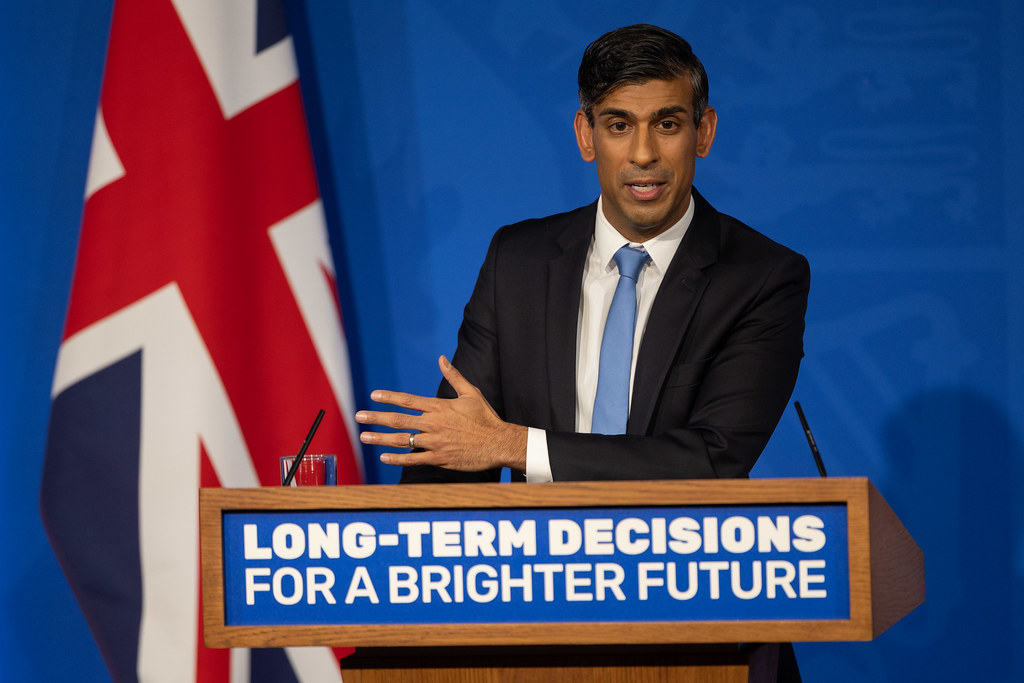Rishi Sunak has today laid out his plans to push back targets on key policies to cut carbon emissions in a speech from the Downing Street press room.
Mr Sunak outlined that the ban on the sale of new petrol and diesel cars will be moved back five years to 2035 and that the transition to heat pumps has also been delayed.
Mr Sunak said: “We seem to have defaulted to an approach which will impose unacceptable costs on hard-pressed British families costs that no one was ever really told about and which may not actually be necessary to deliver the emissions reduction that we need.”
He added: “I’m confident that we can adopt a more pragmatic, proportionate and realistic approach to meeting that zero that eases the burdens on working people”.


The Prime Minister also announced the scrapping of other “unnecessary and heavy-handed measures”. These include proposals on passenger number in cars, the seven bin recycling scheme, new taxes for meat and flying, as well as bans on new oil gas in North Sea.
The original commitments were made to help the UK achieve net zero by 2050, a legally binding target set in 2019, to stop climate change. In the speech, Mr Sunak expressed his “unequivocal” commitment to the target and to pledges made at COP meetings.
However, by watering down these short-term commitments, Mr Sunak gives the UK less time to achieve the net zero targets.
In the speech, Mr Sunak also spoke about how the government will shortly bring forward “comprehensive” reforms to energy infrastructure, which include speeding up planning processes.
A new £150 million “green future fellowship” to support at least 50 leading scientists and engineers to develop new technology was also announced as well as the lifting of the ban on onshore wind.
According to the Guardian, today’s speech was due to be made on Friday, but it is understood it was brought forward after the plans were leaked by a BBC report on Tuesday night.
Mr Sunak spoke on a lectern with a new slogan: “Long-term decisions for a brighter future”. He spoke of a “change to the way our politics works,” and that the climate change announcements were only “the first example” of this new governing style.
Mr Sunak’s environmental policy changes are thought to be motivated by its potential electoral benefit after the Conservative by-election victory in Uxbridge and South Ruislip was in part credited to their opposition to the expansion of the Ultra Low Emission Zone in London.
However, a recent YouGov survey found 71% of the just under 4,000 people they asked either strongly or somewhat supported the government’s pledge to reach net zero by 2050.
Speaking following last night’s leak, the former Conservative energy minister Chris Skidmore told BBC Newsnight that the changes could “potentially the greatest mistake of his premiership”.
The announcements about the push backs on green targets have received heavy criticism from many influential figures, including the former Vice President and climate activist, Al Gore, who told the BBC: “I think it’s unfortunate that he would do that and I think the people of the United Kingdom would largely agree that it’s the wrong decision”.
He added: “I certainly disagree with it…. He’s doing the wrong thing”.
The former Prime Minister Boris Johnson said in a statement today that Mr Sunak “cannot afford to falter” on net zero commitments or “lose our ambition” for the country.
Ford UK chair Lisa Brankin said in a statement: “The UK 2030 target is a vital catalyst to accelerate Ford into a cleaner future. Our business needs three things from the UK government: ambition, commitment and consistency. A relaxation of 2030 would undermine all three”.
Reacting to the speech, Labour’s Shadow climate and net zero secretary, Ed Miliband, said in a statement: “Today is an act of weakness from a desperate, directionless prime minister, dancing to the tune of a small minority of his party. Liz Truss crashed the economy and Rishi Sunak is trashing our economic future”.
He added, “Having delivered the worst cost of living crisis in generations, the prime minister today loads more costs onto the British people. Delaying the phase out of petrol and diesel cars will add billions in costs to families and damage investor confidence in the UK, as we have seen from the furious business reaction today”.
The decision to make these announcements in a speech in Downing Street rather than in the House of Commons was also criticised by the Speaker of the House of Commons, with a spokeswoman for Lindsay Hoyle’s office saying it is “not the way to do business”.
She added: “Ministers are answerable to MPs – we do not have a presidential system here”.

